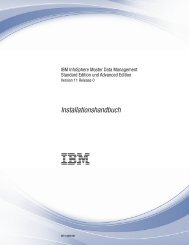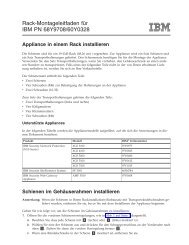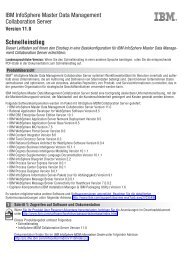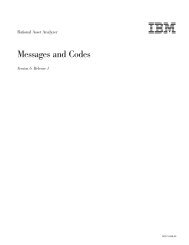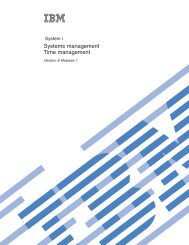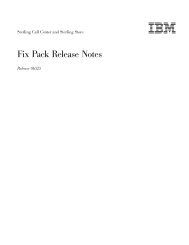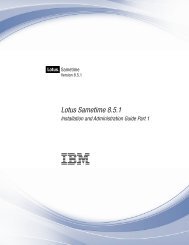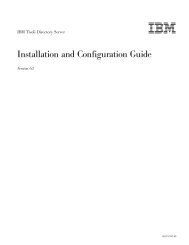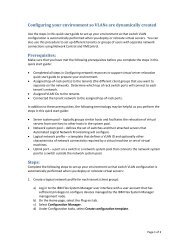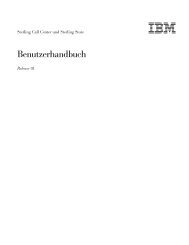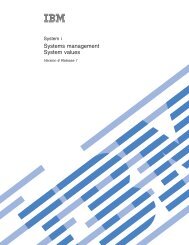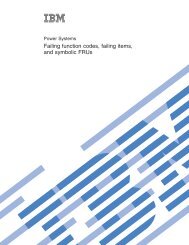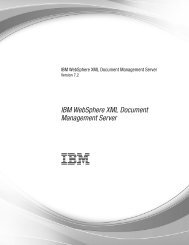System i: Programming Secure Sockets APIs - IBM
System i: Programming Secure Sockets APIs - IBM
System i: Programming Secure Sockets APIs - IBM
Create successful ePaper yourself
Turn your PDF publications into a flip-book with our unique Google optimized e-Paper software.
Qlg_Path_Name_T *keyringFileName (input)<br />
A pointer to a structure defining the path to the key ring file. This structure defines the coded<br />
character set identifier (CCSID) and the path to the key ring file to be used for this job’s SSL<br />
processing. The path must be a fully qualified integrated file system file name.<br />
char *keyringPassword (input)<br />
A pointer to the password for the key ring file named in the keyringFileName field.<br />
If this parameter’s value is equal to NULL, then the QlgSSL_Init() support will attempt to extract a<br />
password from a key-ring password file.<br />
This parameter is assumed to be represented in the same CCSID (coded character set identifier) as the<br />
keyringFileName.<br />
unsigned short int* cipherSuiteList (input)<br />
A pointer to the cipher specification list to be used during the SSL handshake protocol for this<br />
job. This list is a string of concatenated cipher specification values. A cipher specification value is<br />
an unsigned short integer. Any value provided will override any values provided by a previous<br />
QlgSSL_Init() API or the system default cipher specification list if the previous QlgSSL_Init() API<br />
did not provide a cipher specification list. A value of NULL for this parameter indicates one of<br />
the following:<br />
v Use the cipher specification list provided by a previous QlgSSL_Init() API<br />
v Use the system default cipher specification list if a previous QlgSSL_Init() API was not done<br />
The caller specifies the preferred order of the cipher specifications. The cipher specification values, shown<br />
here not in preferred or strength order, are defined in as the following:<br />
Notes:<br />
C Constant Hex <strong>System</strong> Value<br />
TLS_RSA_WITH_NULL_MD5 0x0001 *RSA_NULL_MD5<br />
TLS_RSA_WITH_NULL_SHA 0x0002 *RSA_NULL_SHA<br />
TLS_RSA_EXPORT_WITH_RC4_40_MD5 0x0003 *RSA_EXPORT_RC4_40_MD5<br />
TLS_RSA_WITH_RC4_128_MD5 0x0004 *RSA_RC4_128_MD5<br />
TLS_RSA_WITH_RC4_128_SHA 0x0005 *RSA_RC4_128_SHA<br />
TLS_RSA_EXPORT_WITH_RC2_CBC_40_MD5 0x0006 *RSA_EXPORT_RC2_CBC_40_MD5<br />
TLS_RSA_WITH_DES_CBC_SHA 0x0009 *RSA_DES_CBC_SHA<br />
TLS_RSA_WITH_3DES_EDE_CBC_SHA 0x000A *RSA_3DES_EDE_CBC_SHA<br />
TLS_RSA_WITH_AES_128_CBC_SHA 0x002F *RSA_AES_128_CBC_SHA (TLS Version 1 only)<br />
TLS_RSA_WITH_AES_256_CBC_SHA 0x0035 *RSA_AES_256_CBC_SHA (TLS Version 1 only)<br />
TLS_RSA_WITH_RC2_CBC_128_MD5 0xFF01 *RSA_RC2_CBC_128_MD5 (SSL Version 2 only)<br />
TLS_RSA_WITH_DES_CBC_MD5 0xFF02 *RSA_DES_CBC_MD5 (SSL Version 2 only)<br />
TLS_RSA_WITH_3DES_EDE_CBC_MD5 0xFF03 *RSA_3DES_EDE_CBC_MD5 (SSL Version 2 only)<br />
1. The SSL_RSA_EXPORT_WITH_DES40_CBC_SHA cipher is not supported by i5/OS ®<br />
.<br />
2. The default cipher suite list in preference order when the operating system is installed is as follows:<br />
C Constant <strong>System</strong> Value<br />
TLS_RSA_WITH_AES_128_CBC_SHA *RSA_AES_128_CBC_SHA<br />
TLS_RSA_WITH_RC4_128_SHA *RSA_RC4_128_SHA<br />
TLS_RSA_WITH_RC4_128_MD5 *RSA_RC4_128_MD5<br />
TLS_RSA_WITH_AES_256_CBC_SHA *RSA_AES_256_CBC_SHA<br />
TLS_RSA_WITH_3DES_EDE_CBC_SHA *RSA_3DES_EDE_CBC_SHA<br />
3. The current default cipher suite list can be different from the install time list due to changes made to<br />
the QSSLCSL (SSL cipher specification list) system value via the Change <strong>System</strong> Value (CHGSYSVAL)<br />
66 <strong>System</strong> i: <strong>Programming</strong> <strong>Secure</strong> <strong>Sockets</strong> <strong>APIs</strong>



